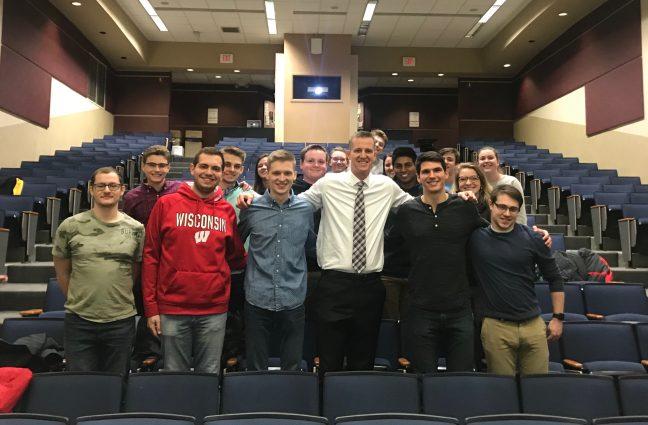University of Wisconsin College Republicans hosted State Sen. Dale Kooyenga, R-Brookfield, Tuesday evening for a talk focused mainly on one of the issues Kooyenga says drives his work as a politician — education.
In 2010, Kooyenga was elected to the Wisconsin State Assembly, where he served for eight years. During this time, education was an issue he focused on the most because of its widespread impacts on so many other aspects of society, such as the economy, he said.
Kooyenga was elected to the Wisconsin State Senate and assumed office in January 2019, where he continues his advocacy for education representing the fifth district.
Kooyenga said that while most students at UW have had good resources and educational opportunities, many others in Wisconsin do not. Milwaukee is rated among the worst U.S. urban school districts when it comes to reading, according to the MacIver Institute. In Wisconsin’s largest district, Milwaukee Public Schools, proficiency rates were on average 12 to 15 percent, which is well below state and national averages.
Kooyenga highlighted the importance of education by referencing social reformer and abolitionist during the Civil War era, Frederick Douglass. During Douglass’ time as a slave, there was a law that did not allow any person to attempt to teach any free person of color, or slave, to spell, read or write.
Douglass taught himself to read and write, knowing that learning how to read was the key to his freedom, which he later achieved.
“This story really drives me on the educational front,” Kooyenga said. “But what does this say about the ability [children in Milwaukee schools] to have the freedom to pursue the careers that they want and the freedom to communicate and express their thoughts? It doesn’t give them that opportunity.”
Kooyenga said that he believes that parents should have a choice about where they send their children for school, and he is particularly concerned with Gov. Tony Evers’ proposed budget that hopes to put caps on school voucher programs.
Kooyenga said school choice is an important component to closing Wisconsin’s achievement gap.
“The U.S. is not the most powerful nation because we are the largest nation — we aren’t and we never will be,” Kooyenga said. “We don’t have a bounty of natural resources — we don’t and we never will. But we do have people who are entrepreneurial and dynamic, and thats what makes us the best in the world. That’s why I get so excited talking to you guys because if you guys challenge yourselves, we’re limitless.”


